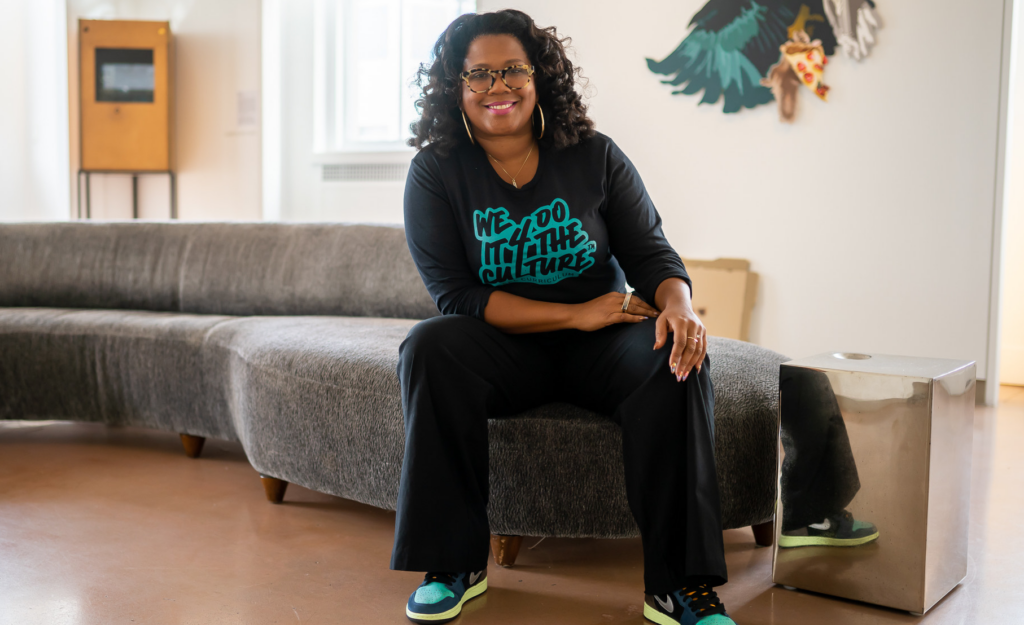May 13, 2024
Jamila Sams, founder of We Do It For The Culture, helps children grow Social Emotional Learning skills by developing a curriculum rooted in Hip-Hop.
Jamila Sams is a former educator, hip-hop head, and businesswoman. As founder of We Do It For The Culture, Sams is using her experience and passion to help children grow Social Emotional Learning (SEL) skills by developing a curriculum rooted in hip-hop culture. The curriculum is designed to hook and engage students in meaningful lessons beyond academics.
BLACK ENTERPRISE spoke with Sams about We Do It For The Culture’s mission, processes, and motivation. When asked about the reason she left the traditional school system, her story echoes that of many educators across the country.
“My last year being an administrator, I was challenged as an assistant principal of what’s called a turnaround school. I wanted to elevate the consciousness of the students and parents. But to get past all of those layers of, as Lauren says, The Miseducation, it was a lot on me,” she said.
“There wasn’t enough Jamila in the space in order to make the work happen. I was burned out.”
Understanding that the need for mental and emotional support was greater than any individual could provide, Sams stepped out of traditional education. Sams, a lover of hip-hop, is considered Gen-X. Needless to say, her experience with hip-hop culture is not the same as Gen-Z’s. While the early stages of hip-hop celebrated and revered lyrical prowess, dance, creativity, and innovation, the new generation of popular rap, critics say, sometimes focuses on negative stereotypes. Sams says even though the culture has changed, “we don’t have to demean” the new guard. According to Sams, there are ways to bridge the gaps and use the essence of the culture to help students learn and grow.
“We may talk about the RICO case with Gunna through the lens of civic action. Should lyrics be used in a court of law? Let’s have a debate about that. We can acknowledge what you’re listening to, Gunna, Meg the stallion or whoever. Then have a conversation about the things that aren’t being said, like civil action or mental health” Sams said.
Sams knows of schools that have implemented programs “around hip-hop pedagogy or even just active engagement pedagogy” still there are many obstacles in the way when it comes to facilitating a program of this kind. Both school districts and teachers need to be on board in order for the program to yield results.
She explained, “I wanna know if everybody knows the mission and vision of your school? What are the attitudes towards student voice and student choice? Based on the data, we’ll customize the training.”
We Do It For The Culture is so dedicated and confident in its ability to help students grow that a free one-year subscription is offered. BE asked why Sams decided to sacrifice profit with this offer, she replied:
“I’m giving it away because the culture is free, right? Like when you think about it, these are things that we just do organically. So if using these free lessons can help you to engage with your students then by all means.”
Sams has built partnerships with institutions outside of the school system like the National Urban League and Big Brother Big Sisters. She invites schools of all demographics to join as the culture extends to all demographics and We Do It For The Culture has found success all over the United States.
“What most people don’t seem to understand is that hip-hop is universal and there’s a lot of districts, especially in the suburbs where students are engaging with hip-hop culture. The influence is there. It’s really interesting to see the impact that it’s having in spaces like Portland, Oregon, or in Lancaster, Texas,” she said.
Finding success state-wide Sams hopes to expand the curriculum.
She says, “We wanna be able to leverage the culture to raise awareness about things that are happening in different parts of the world where people are not being seen, heard, and valued.”
That will be the next phase for the culture, really customizing the content based on geographic locations.
RELATED CONTENT: Homeschooling May Be The ‘Fastest-Growing’ Form Of Education In The U.S. Right Now
Enter your Email Address below to get our fun-filled Newsletter!
© 2024 Black Enterprise. All Rights Reserved.

